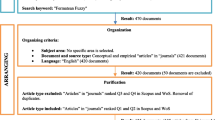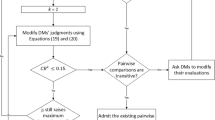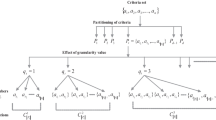Abstract
A superiority-inferiority-based inexact fuzzy-stochastic chance-constrained programming (SI-IFSCCP) approach is developed for supporting long-term municipal solid waste management under uncertainty. Through SI-IFSCCP, multiple uncertainties expressed as intervals, possibilistic and probabilistic distributions, as well as their combinations, could be directly communicated into the optimization process, leading to enhanced system robustness. Through tackling fuzziness and two-layer randomness, various subjective judgments of many stakeholders with different interests and preferences could be extensively reflected, guaranteeing a lower degree of biases during data sampling and a higher degree of public acceptance for the generated plans. Two levels of system-violation risk could also be reflected by SI-IFSCCP, reflecting the relationship between economic efficiency and system reliability. A two-step solution method with improved computational efficiency is proposed for SI-IFSCCP. To demonstrate its applicability, the developed methodology is then applied to a long-term municipal solid waste management problem. Useful solutions have been generated. Satisfactory waste flow plans could be identified according to system conditions and policy inclination, supporting in-depth tradeoff analyses between system optimality and reliability as well as between economic and environmental objectives.








Similar content being viewed by others
References
Baetz BW (1990) Capacity planning for waste management systems. Civ Eng Syst 7(4):229–235
Cai YP, Huang GH, Nie XH, Li YP, Tan Q (2007) Municipal solid waste management under uncertainty: a mixed interval parameter fuzzy-stochastic robust programming approach. Environ Eng Sci 24(3):338–352
Cai YP, Huang GH, Lu HW, Yang ZF, Tan Q (2008) I-VFRP: an interval-valued fuzzy robust programming approach for municipal waste management planning under uncertainty. Eng Optim. doi:10.1080/03052150802488381
Cai YP, Huang GH, Yang ZF, Lin QG, Tan Q (2009a) Community-scale renewable energy systems planning under uncertainty—an interval chance-constrained programming approach. Renew Sustain Energy Rev 13(4):721–735
Cai YP, Huang GH, Lin QG, Nie XH, Tan Q (2009b) An optimization-model-based interactive decision support system for regional energy management systems planning under uncertainty. Expert Syst Appl 36(2):3470–3482
Chanas S, Zielinski P (2000) On the equivalence of two optimization methods for fuzzy linear programming problems. Eur J Oper Res 121(1):56–63
Chang NB, Wang SF (1997) A fuzzy goal programming approach for the optimal planning of metropolitan solid waste management systems. Eur J Oper Res 99(2):303–321
Charnes A, Cooper WW, Kirby P (1972) Chance constrained programming: an extension of statistical method. In: Rustagi J (ed) Optimizing methods in statistics. Academic Press, New York, pp 391–402
Chiang J (2001) Fuzzy linear programming based on statistical confidence interval and interval-valued fuzzy set. Eur J Oper Res 129(1):65–86
Croft HT, Falconer KJ, Guy RK (1991) Unsolved problems in geometry. Springer, New York
Ellis JH (1991) Stochastic programs for identifying critical structural collapse mechanisms. Appl Math Model 15(7):367–373
Fortemps P, Roubens M (1996) Ranking and defuzzification methods based on area compensation. Fuzzy Set Syst 82:319–330
Huang GH (1998) A hybrid inexact-stochastic water management model. Eur J Oper Res 107(1):137–158
Huang GH, Baetz BW, Patry GG (1994) Grey dynamic programming for solid waste management planning under uncertainty. J Urban Plann Dev 120(3):132–156
Huang GH, Baetz BW, Patry GG (1995) Grey integer programming: an application to waste management planning under uncertainty. Eur J Oper Res 83:594–620
Huang GH, Baetz BW, Patry GG, Terluk V (1997) Capacity planning for an integrated waste management system under uncertainty: a North American case study. Waste Manag Res 15(5):523–546
Huang GH, Sae-Lim N, Liu L, Chen Z (2001) An interval-parameter fuzzy-stochastic programming approach for municipal solid waste management and planning. Environ Model Assess 6(4):271–283
Infanger G (1993) Monte Carlo (importance) sampling within a Benders decomposition algorithm for stochastic linear programs. Ann Oper Res 39(1–4):69–95
Infanger G, Morton DP (1996) Cut sharing for multistage stochastic linear programs with interstage dependency. Math Program 75(2):241–256
Inuiguchi M, Sakawa M (1998) Robust optimization under softness in a fuzzy linear programming problem. Int J Approx Reason 18(1–2):21–34
Li YP, Huang GH, Nie SL, Qin XS (2007) ITCLP: an inexact two-stage chance-constrained program for planning waste management systems. Resour Conservat Recycl 49(3):284–307
Luhandjula MK (1996) Fuzziness and randomness in an optimization framework. Fuzzy Set Syst 77(3):291–297
Maqsood I, Huang GH, Zeng GM (2004) An inexact two-stage mixed integer linear programming model for waste management under uncertainty. Civ Eng Environ Syst 21(3):187–206
Maqsood I, Huang GH, Huang YF, Chen B (2005) ITOM: an interval-parameter two-stage optimization model for stochastic planning of water resources systems. Stoch Environ Res Risk Assess 19(2):125–133
Morgan DR, Eheart JW, Valocchi AJ (1993) Aquifer remediation design under uncertainty using a new chance constrained programming technique. Water Resour Res 28(3):551–561
Najm MA, El-Fadel M, Ayoub G, El-Taha M, Al-Awar F (2002) An optimization model for regional integrated solid waste management I. Model formulation. Waste Manag Res 20(1):37–45
Nie XH, Huang GH, Li YP, Liu L (2007) IFRP: a hybrid interval-parameter fuzzy robust programming approach for waste management planning under uncertainty. J Environ Manag 84(1):1–11
Tan Q, Huang GH, Wu CZ, Cai YP, Yan XP (2009) Development of an inexact fuzzy robust programming model for integrated evacuation management under uncertainty. J Urban Plann Dev 135(1):39–49
Van Hop N (2007) Solving fuzzy (stochastic) linear programming problems using superiority and inferiority measures. Inform Sci 177:1977–1991
Yeomans JS, Huang GH, Yoogalingam R (2003) Combining simulation with evolutionary algorithms for optimal planning under uncertainty: an application to municipal solid waste management planning in the Regional Municipality of Hamilton-Wentworth. J Environ Inf 2(1):11–30
Zare Y, Daneshmand A (1995) A linear approximation method for solving a special class of the chance constrained programming problem. Eur J Oper Res 80(1):213–225
Zimmerman HJ (1991) Fuzzy sets theory and its applications. Kluwer, Boston
Acknowledgments
This research was supported by the Major State Basic Research Development Program of MOST (2005CB724200 and 2006CB403307) and the Natural Science and Engineering Research Council of Canada. The writers are extremely grateful to the editors and the anonymous reviewers for their insightful comments and suggestions.
Author information
Authors and Affiliations
Corresponding author
Rights and permissions
About this article
Cite this article
Tan, Q., Huang, G.H. & Cai, Y.P. Identification of optimal plans for municipal solid waste management in an environment of fuzziness and two-layer randomness. Stoch Environ Res Risk Assess 24, 147–164 (2010). https://doi.org/10.1007/s00477-009-0307-1
Published:
Issue Date:
DOI: https://doi.org/10.1007/s00477-009-0307-1




